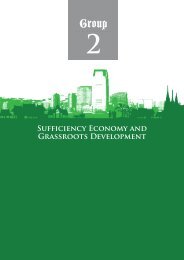Conflict, Legitimacy and Government Reform: Equitable Allocation of ...
Conflict, Legitimacy and Government Reform: Equitable Allocation of ...
Conflict, Legitimacy and Government Reform: Equitable Allocation of ...
You also want an ePaper? Increase the reach of your titles
YUMPU automatically turns print PDFs into web optimized ePapers that Google loves.
38 KPI Congress XI<br />
Pr<strong>of</strong>essor Dr. Kraiyut Theeratayakinan, who already passed away, once<br />
told me that the word ‘tham (fair)’ means nature (thammachart) whose<br />
meaning can be interpreted in several ways. I don’t want to use the word<br />
‘sangkom yutitham (fair society)’ because the topic is not about enactment<br />
<strong>of</strong> laws. I don’t want to use the word ‘sue sangkom thaothiam kan (towards<br />
an equitable society)’ because my topic is not intended to make everyone<br />
equal or equitable. I remember when I was a child, we must share things<br />
that we have. We <strong>of</strong>ten asked, “Is it fair to divide it like this?” In fact,<br />
we’re implying, “Is it acceptable?” We need to ask this question to ensure<br />
that everyone agrees that the division is a fair share, so we won’t bicker<br />
over it later. Therefore, the question “Is it fair?” opens an opportunity for<br />
those who disagree to express their opinions. If they still disagree, a new<br />
agreement has to be reached. So, agreement is very important.<br />
An acceptable fair society doesn’t need to be equal in everything but<br />
it must be equitable in terms <strong>of</strong> opportunities, security in life, political<br />
participation <strong>and</strong> the fact that children <strong>and</strong> gr<strong>and</strong>children will have<br />
equally bright futures.<br />
History <strong>of</strong> various societies asserts that these societies could not<br />
develop themselves but they have been borne out <strong>of</strong> the results produced<br />
by the people in such societies. A key factor is there must be a<br />
government system which is responsive to dem<strong>and</strong>s <strong>of</strong> various societal<br />
groups in balanced manners. The mechanisms <strong>of</strong> a modern government<br />
that can satisfy this include fiscal policy, taxation, <strong>and</strong> allocation <strong>of</strong> taxes.<br />
Additionally, public utilities <strong>and</strong> social services must be created to satisfy<br />
people’s needs <strong>and</strong> foster the economy. If the government cannot fulfill<br />
these objectives, such society tends to slide towards ever-increasing<br />
inequality. Eventually, the society might develop conflicts between the<br />
“super rich” <strong>and</strong> the “middle class” on one side <strong>and</strong> the “majority poor”<br />
on the other side.….until it becomes a structure-based conflict, waiting<br />
to explode one day (Bavornsak 2009: 6)<br />
Presently, there has been a growing acceptance that the underlying<br />
cause <strong>of</strong> ongoing political conflict we’re facing is inequality in Thai<br />
society.














